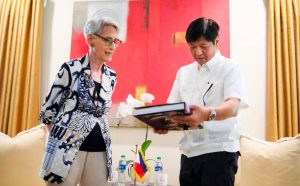Just weeks after his decisive electoral victory, Philippine President-elect Ferdinand Marcos Jr. met U.S. Deputy Secretary of State Wendy Sherman, who wasted no time highlighting the “long-standing” U.S.-Philippine alliance. Crucially, the senior U.S. official also assured the ex-dictator’s son – who has been facing a $353 million contempt charge in a U.S. court, among other charges – of “sovereign immunity,” should he visit the United States in the near future.
Both Marcos Jr. and his mother, the former First Lady Imelda Marcos, have been convicted of various crimes in local and overseas courts, yet have been elected to multiple offices. Critics worry that the return of the notorious dynasty, which pillaged the Philippines and wielded an iron fist throughout the 1970s and early 1980s, will exacerbate judicial impunity and corruption in the Philippines, and could even spark the formal abolition of anti-corruption and human rights bodies.
Marcos Jr.’s election represents the latest chapter in a tradition of power being concentrated in the hands of a few influential families – a reality that comes at a high cost, as underscored by the Bertelsmann Transformation Index in its latest country report. “In the Philippines, the long-lasting and entrenched dominance of various family clans prevent the reforms which are necessary for the further deepening of democracy and a transformation to a more just market economy,” it states.
Cognizant of concern about the new president’s democratic credentials, Sherman reminded the public that she raised human rights issues with the ex-dictator’s son – but added that “[n]o nation has a perfect track record.”
U.S. President Joe Biden was the first foreign leader to congratulate the new Filipino leader over the phone, even before official results were released and concerns about reported irregularities were addressed, while U.S. Embassy in Manila Chargé d’Affaires Heather Variava was among first foreign diplomats to meet Marcos Jr. last month. Clearly, realpolitik undergirds Washington’s approach to the new Filipino leader.
And the U.S. has reason to seek a cooperative relationship with the new Philippine leader compared to the outgoing Rodrigo Duterte, who repeatedly threatened to nix the country’s century-old alliance with the U.S. in favor of China. A potent combination of structural constraints, the strategic legacy of his father, and personal predisposition has nudged Marcos Jr. towards turning over a new leaf in Philippine-U.S. relations.
Wooing Chinese Investment
To be clear, Marcos Jr. will be careful to maintain relations with Beijing. On one hand, he was the only presidential candidate who openly backed Duterte’s China policy, arguing that the “policy of engagement, which the Duterte government is implementing, although it is criticized, it is the right way to go,” since “we don’t want to go to war with China” over the South China Sea. Moreover, the Marcoses have maintained warm ties with Beijing throughout the decades.
His father, Ferdinand Marcos, was among the first U.S. allies to establish formal diplomatic relations with Maoist China. And decades after his downfall, the Marcoses, now the overlords of the northern province of Ilocos Norte, maintained warm commercial and political ties with China as part of the Maritime Silk Road Initiative (MSRI). As president, Marcos Jr. will actively court large-scale Chinese investment in order to fund his ambitious infrastructure development initiative and boost economic growth after five quarters of recession during 2020 and 2021.
At the same time, the incoming Filipino president has taken a tougher stance on the South China Sea disputes, repeatedly reiterating the finality of the arbitral tribunal ruling in the South China Sea against Beijing and making it clear that he will not “compromise it in any way.” His incoming National Security Advisor has also vowed to pursue “critical engagement” with Beijing, underscoring a less subservient stance on maritime disputes with the Asian powerhouse.
Marcos’ tougher stance towards Beijing, and his warm engagement with Washington, is the result of a number of factors. To begin with, the incoming Philippines president faces a number of structural constraints, namely widespread anti-Beijing sentiment among Filipinos and among the defense establishment, which frets over China’s creeping presence across Philippine waters, active harassment of Filipino fishermen and warships, and the non-fulfillment of large-scale investment pledges.
An Anglophile President
A shrewd politico, Marcos Jr. is aware of the risks of continuing his predecessor’s open flirtation with China. He also lacks his predecessor’s lifelong resentment against the West, which colored Duterte’s policies toward Washington. In contrast, Marcos Jr. and much of his family are products of Western educational institutions.
If anything, the incoming Filipino president, who plays saxophone and had academic stints at Oxford and Wharton, is an aficionado of British culture. During his six years in power, Duterte refused to visit a single Western capital whereas Marcos Jr. is likely to become the first Filipino president to visit the White House in almost a decade.
Finally, Marcos Jr. will likely follow in the footsteps of his father, who strengthened his political hand by deftly maintaining communication channels with multiple superpowers.
Breaking with Duterte’s pro-China legacy, just days after winning the presidency, Marcos Jr. denied his Beijing-friendly running-mate, the former leader’s daughter, Sara Duterte-Carpio, the crucial post of the Department of National Defense.
Marcos Jr. has warmly welcomed dignitaries from Europe, Japan, India, and South Korea, adding to signals about his preference for a foreign policy that is neither too dependent on U.S. nor too friendly to China, instead seeking a wide network of strategic partnerships. On foreign policy, it seems that the apple doesn’t fall far from the tree.
This article was originally published on the website of the Bertelsmann Stiftung’s BTI Transformation Index, and is reprinted with permission.

































